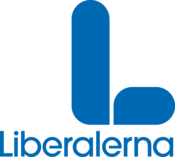Liberal People's Party (Sweden)
|
Liberals
Liberalerna |
|
|---|---|
 |
|
| Abbreviation | L |
| Leader | Jan Björklund |
| Founded | 5 August 1934 |
| Headquarters | Stora Nygatan 2A, |
| Youth wing | Liberal Youth of Sweden |
| Ideology |
Liberalism Social liberalism Pro-Europeanism |
| Political position | Centre-right |
| National affiliation | Alliance |
| European affiliation | Alliance of Liberals and Democrats for Europe |
| International affiliation | Liberal International |
| European Parliament group | Alliance of Liberals and Democrats for Europe |
| Colours | Blue, orange |
| Riksdag |
19 / 349
|
| European Parliament |
2 / 20
|
| County councils |
96 / 1,597
|
| Municipal councils |
710 / 12,780
|
| Website | |
| liberalerna.se | |
The Liberals (Swedish: Liberalerna, L) is a liberal and social-liberalpolitical party in Sweden. It was a part of the Alliance centre-right coalition government led by Prime Minister Fredrik Reinfeldt from 2006 to 2014. The party is the seventh-largest party in the Swedish Riksdag. Until 22 November 2015 it was known as the Liberal People's Party (Folkpartiet liberalerna). The party is a member of the Liberal International and Alliance of Liberals and Democrats for Europe.
While the party historically was positioned in the centre of the Swedish political landscape, willing to cooperate with both the political left and the right, it has since the leaderships of Lars Leijonborg and Jan Björklund in the 2000s become more conservative and positioned itself clearly on the right. The party's policies include action toward a free market economy and pushing for Sweden to join NATO and the Eurozone, as well as investing in nuclear power; lately it has focused more on gender equality and the school system.
The official party ideology has historically been social liberalism, which translates as a strong ideological commitment to a mixed economy, with support for comprehensive but market-based welfare state programs.
While initially allied with the Swedish Social Democratic Party in the struggle for democracy (achieved in 1921) and social reform, the People's Party came to be part of the opposition from the thirties and onwards, opposing Social Democrat demands for nationalization of private businesses. It has stayed opposed to the Social Democrats ever since, often as the largest or second-largest party of the opposition block (called the non-socialists or "de borgerliga", approximately the bourgeois), but often equally critical towards parties on the right. Over time, this has shifted towards a more clear-cut rightwing role. In the mid-nineties the party seemed to have ruled out the alternative of co-operation with the Social Democrats, focusing instead on bringing them down by strengthening the opposition.
...
Wikipedia
